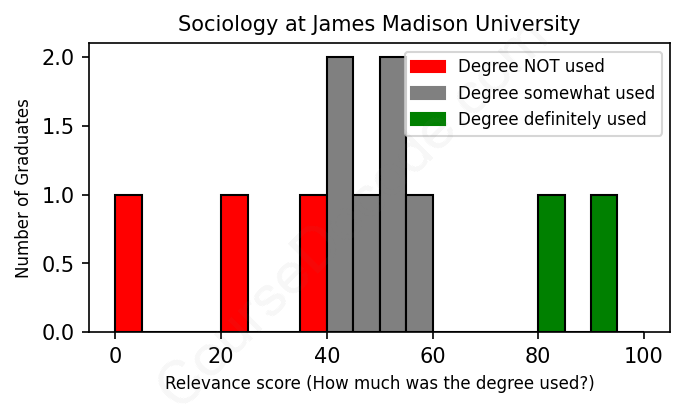
First, some facts. Of the Sociology graduates from James Madison University we've analyzed , here's how many have used (or NOT used) their degree in their career:

These are estimates based on AI analysis of 11 LinkedIn profiles (see below).
The verdict? Significantly below average. Overall, with an average relevance score of 47%, Sociology graduates from James Madison University have a much lower likelihood (-20%) of finding work in this field compared to the average graduate across all fields:
And for comparison, here's the chart for all profiles we've looked at across all degrees.
Also, after graduating, only 27% of these graduates have pursued further education other than another Bachelor's degree (such as a Masters degree or other), compared to the average across all profiles of 35%. This suggests a Bachelors degree is enough for most Sociology graduates, and it's normal to look for work straight after graduation.
See the details:
|
Relevance score: 21% We think this person has NOT gone into a career related to their degree. We think this person has NOT gone into a career related to their degree.
DEGREE INFOGraduated in 2020 from James Madison University with a Bachelor of Arts - BA in Sociology. No other secondary education since. JOB HISTORY SINCE GRADUATIONGuest Services Associate European Wax Center Jun 2020 - Apr 2022 Sales Advisor  H&M Dec 2020 - Apr 2022 Visual Merchandiser  H&M Apr 2022 - Feb 2023 Business Coordinator  Harmonia Holdings Group, LLC Feb 2023 - May 2024 Executive Assistant and Operations  ITegrity, Inc. - A trusted 8(a) Technology, Engineering, and Management Services Provider May 2024 - Present ABOUTNo information provided. |
The top 10 most common jobs done by the graduates we've analyzed (ranked most common to least) are:
Here is a visual representation of the most common words in job titles for Sociology graduates (this is across all Sociology graduates we've analyzed, not just those who went to James Madison University):

Looking at the career trajectories of Sociology graduates from James Madison University, there seems to be a mixed bag of outcomes. Right after graduating, many alumni land roles in education, social services, and various support positions. For instance, some started as teachers or instructors, which is directly connected to their studies in Sociology, where they can apply their understanding of human behavior and social structures. Others took on roles in organizations that focus on mental health and community services, which are also relevant fields for Sociology majors. However, a substantial number seem to drift into jobs that aren’t closely related to their degree, like claims adjusters at insurance companies or managing roles in retail or services.
Now, fast-forwarding five to ten years, some graduates appear to find their footing in careers tied to their Sociology background. Positions at health services or educational institutions suggest that they’ve built on their undergraduate experiences and maybe even furthered their education. Still, there are quite a few who seem to have shifted entirely into business or unrelated fields, such as real estate or various managerial roles. Overall, while many graduates are successfully working in fields where they can utilize their Sociology training, there are also those who end up in jobs that don’t reflect the specialized skills and knowledge they gained during their studies. It's a bit of a mixed picture, but there are definitely paths to rewarding careers for those who leverage their Sociology degree effectively!
Honestly, a Bachelor’s degree in Sociology at James Madison University, like many places, falls somewhere in the middle when it comes to difficulty. It’s not as intense as some STEM degrees, but it does require a fair amount of reading, writing, and critical thinking. You’ll be diving into topics about society, culture, and human behavior, which can definitely be fascinating but also can get complex. If you enjoy analyzing things and have a good grasp on writing essays, you might find it pretty manageable. Just be ready to engage with a lot of theories and research – it won’t be a walk in the park, but it’s definitely doable if you stay organized and interested!
Most commonly, in the LinkedIn profiles we've looked at, it takes people 4 years to finish a Bachelor degree in Sociology.
When you look at what these Sociology grads from James Madison University have been up to, it’s a mixed bag in terms of earnings. Some have managed to land solid roles in education or health services, which can pay decently over time, especially if they move up the ladder in those fields. But others started off in entry-level positions, like secretarial work or teaching, which aren't typically high-paying gigs. Plus, stuff like professional basketball might sound great, but the stability and income can be unpredictable. Overall, some seem to have found their way to decent paychecks, especially those in clinical roles and management, while others are still grinding through roles that won't necessarily pay the bills well long-term. It just goes to show that the path after college can really vary!
Here is a visual representation of the most common words seen in the "about" section of LinkedIn profiles who have a Bachelor degree in Sociology (this is across all Sociology graduates we've analyzed, not just those who went to James Madison University). This may or may not be useful:

Here are all colleges offering a Bachelor degree in Sociology (ordered by the average relevance score of their Sociology graduates, best to worst) where we have analyzed at least 10 of their graduates: